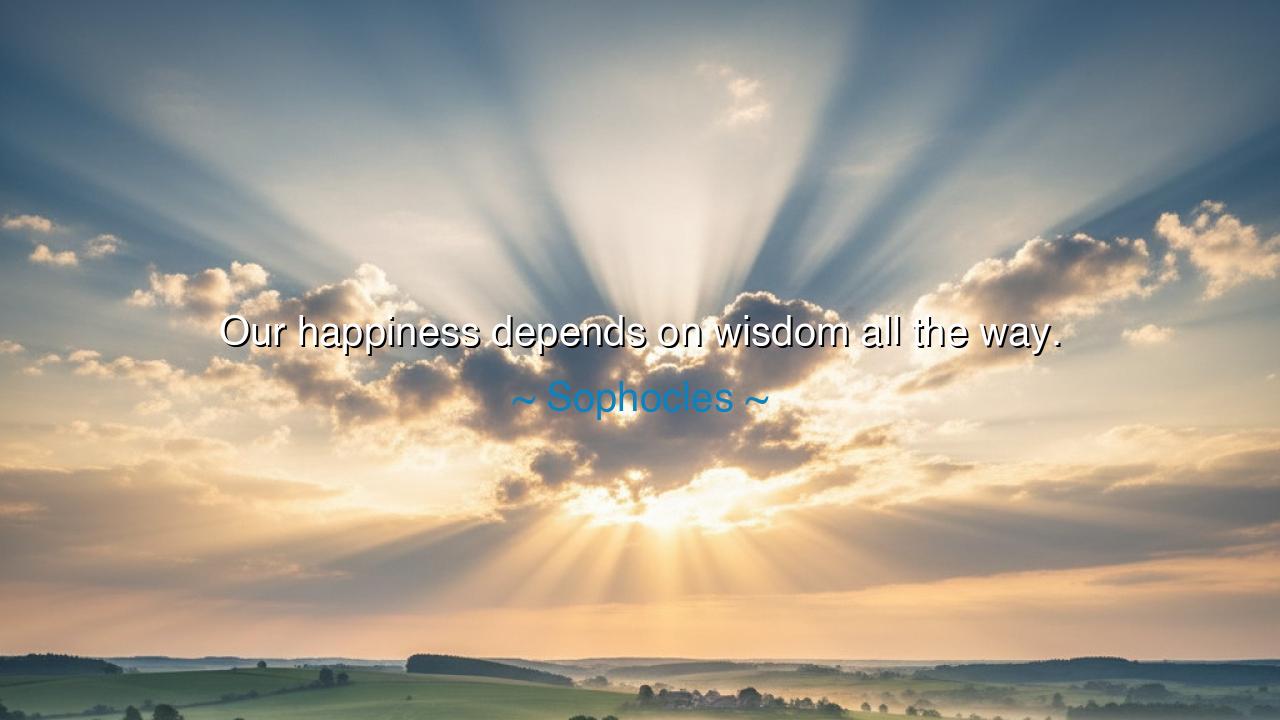
Our happiness depends on wisdom all the way.






The ancient dramatist Sophocles, whose words have echoed through the centuries like the voice of the gods themselves, once wrote: “Our happiness depends on wisdom all the way.” These few words, though simple in form, carry the weight of an eternal truth. For Sophocles, who lived among heroes and tragedies, knew that happiness is not born from chance, nor wealth, nor power—but from wisdom, that quiet and steadfast guide of the soul. To be wise is to live in harmony with the laws of life, to see clearly through illusion, and to walk the path of virtue even when the road is steep.
In his tragedies, Sophocles did not speak of wisdom as mere intellect, nor as knowledge gathered from books or scholars. To him, wisdom was something divine—an alignment between the heart and the eternal order of the cosmos. It was the insight that comes only through suffering, reflection, and humility. The Greeks called it sophia, a sacred understanding of life’s rhythms, of joy and sorrow, of pride and downfall. And so when he said that happiness depends on wisdom, he meant that joy cannot live in the heart of the reckless or the blind; it blossoms only in those who learn, who listen, and who grow.
The origin of this truth can be found in Sophocles’ final play, Oedipus at Colonus, where the tragic king, having been broken by fate, finally attains peace. In his youth, Oedipus was powerful, proud, and sure of his own intellect. He defeated the riddle of the Sphinx, yet could not solve the riddle of his own soul. His arrogance brought him ruin, for he acted without wisdom—without humility before destiny’s laws. But in his exile, blind and stripped of all he once possessed, he found something far greater than knowledge: understanding. Through pain, he gained wisdom, and through wisdom, at last, he found peace. Thus, Sophocles declared through his art that only wisdom can lead a soul from suffering to serenity.
We see this same truth reflected throughout the tapestry of human history. Consider Mahatma Gandhi, who led his people not with violence, but with wisdom—the understanding that true power comes not from domination, but from self-restraint and compassion. When the world burned with anger and vengeance, he remained calm as the sea, guided by moral clarity. His happiness, and that of his nation, did not come easily; it was forged in the fire of patience and guided by inner wisdom. Those who acted from hatred fell to despair, but Gandhi, who acted from understanding, found a deeper joy—the joy that comes when one’s actions are rooted in truth.
Yet how many among us seek happiness in folly! We chase pleasure, wealth, and fleeting triumphs, imagining that they will fill the emptiness within. But Sophocles, with the voice of the ancients, warns us: without wisdom, happiness decays into vanity. The man who acts without thought may enjoy a brief delight, but soon his own choices ensnare him. The wise, on the other hand, find contentment even in hardship, for they see beyond the surface of events. To them, every sorrow hides a lesson, every obstacle conceals an opportunity for growth. Such souls walk steadily through both joy and grief, untouched by the chaos that sways the ignorant.
To live wisely, then, is not to withdraw from the world, but to engage with it consciously. Wisdom is the art of seeing life as it is, not as we wish it to be. It is the courage to act justly, even when it costs us dearly; the patience to endure what cannot be changed; and the discernment to know the difference. If we cultivate wisdom, happiness will follow us as a shadow follows the sun. Without it, even our pleasures will turn to dust.
So, my children, remember this teaching of Sophocles: do not seek happiness as a prize, for it will always slip through your grasp. Seek wisdom, and happiness will come of its own accord. Let every day be your teacher—observe, reflect, and listen to the quiet voice within. Guard against arrogance, for pride blinds the eye to truth. Show humility before life’s mysteries, for only the humble can learn. And when pain visits you, do not curse it; let it instruct you. For from the ashes of suffering, wisdom is born—and from wisdom, the deepest and truest happiness flows.
In this way, you will walk the path the ancients knew—the path of harmony between thought, deed, and destiny. And when you reach the twilight of your years, your heart will be at peace, for you will know what Sophocles knew: that wisdom is not only the root of joy, but the very essence of being fully, beautifully alive.






AAdministratorAdministrator
Welcome, honored guests. Please leave a comment, we will respond soon